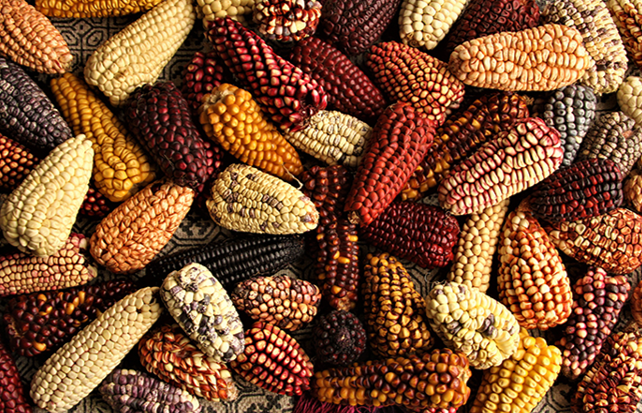For the first time, a coordinated delegation of family farming organizations from the World Rural Forum (WRF) is actively participating in COP16, advocating for family farmers to be included in global discussions on biodiversity conservation.
Cali, October 28, 2024 – As part of the United Nations Convention on Biological Diversity (CBD), the city of Cali, Colombia, is hosting COP16 from October 21 to November 1, a pivotal event for global biodiversity protection. Having obtained official observer status at the CBD in 2024, the WRF is closely monitoring negotiations and participating in several key events, including the official Presidential event for Food Day at COP16 (October 28).
During these days, WRF’s family farmers’ organizations, AFA, COPROFAM and INOFO, are working to highlight and strengthen the critical role of family farmers in biodiversity conservation and climate action. Their efforts emphasize the need for greater support to enhance sustainable initiatives they already implement, such as seed exchange systems and crop diversification. These agroecological practices hold vast potential for protecting biodiversity globally and must be bolstered to meet both climate and conservation challenges.
This COP is taking place amid growing awareness of the biodiversity crisis and presents a vital opportunity to reshape conservation and sustainability strategies. Since October 21, negotiations have centered on implementing the Global Biodiversity Framework, adopted in 2022, focusing on setting progress indicators and exploring real solutions to fund the Framework’s objectives.
What Do Family Farmers Have to Say?
Family farmers play a crucial role in preserving much of the world’s agrobiodiversity. Therefore, it is essential to amplify their voices in international discussions, emphasizing:
- Recognition of family farmers as a catalysts for biodiversity conservation and climate change adaptation, respecting and acknowledging their on-the-ground experiences
- Active participation in policy processes and decision-making. Policies must be developed not just FOR family farmers but WITH them. Their involvement in forums like COPs is essential to shape global decisions.
- Direct financing to scale up best practices. In line with global agreements on climate change, biodiversity, and desertification, MORE and BETTER financing is needed to expand family farmers’ initiatives and improve global biodiversity.
Supporting family farmers helps aggregate diverse products from varied landscapes, fostering biodiversity-friendly practices like agroecology. This is crucial for achieving the Global Biodiversity Framework’s goals, especially Target 10.
Aligned with the United Nations Decade of Family Farming (UNDFF), which recognizes the intrinsic link between family farming and biodiversity conservation (A/RES/72/239), particularly through Pillars 6 and 7 of its Global Action Plan, family farmers must be recognized as a key partners in building sustainable and climate-resilient food systems. Moreover, it is vital to strengthen family farming’s multidimensional role to promote policies that protect food systems and biodiversity.
A Path for the Three Rio Conventions
When family farmers commit to agroecology, they do not merely adopt practices to protect biodiversity, address climate change, or combat desertification. Instead, they create diversified agroecosystems that tackle all these challenges simultaneously.
Take the example of Alfredo and Gladys, two Colombian farmers who left city life to become self-sufficient through agroecological farming on their half-hectare plot. They developed a diversified agroecosystem with over 200 plant species, livestock, and beehives, addressing major global challenges. For instance, their farm’s vegetation cools the area by up to 9 degrees Celsius during heatwaves, and their use of organic fertilizers, derived from animal manure and crop residues, aids in moisture retention and carbon sequestration in their soils. This holistic approach demonstrates how family farmers’ solutions can address multiple global issues at once.
With this comprehensive vision, WRF will continue its efforts at the upcoming Climate Change Convention in Baku in November and the Desertification Convention in Saudi Arabia in December. Across all three conventions, WRF will advocate for increased support and recognition of family farmers as vital allies in addressing interconnected global challenges.
In summary, WRF’s participation in COP16 marks the first of three COPs, with a clear goal: to have family farmers and their organizations recognized as essential partners in the global challenge of sustainability. It is critical to ensure that the voices of those who produce 80% of the world’s food are included in decisions that will shape the planet’s future.
The WRFs’ delegation of family farmers’ organizations at COP16 in Cali is participating in several noteworthy events. Below are some we consider of interest:
- Oct 28: Official Food Day at COP16 – FAO Joint SESSION 2. Empowering farmers and Indigenous People as stewards of biodiversity for food and agriculture
- Oct 29: Common Ground on Regenerative Agriculture for a Sustainable Future: Screening & Farmers Dialogue
Past event:
- Oct 25: Harnessing Agroecology, Agrobiodiversity, and Family Farming to Transform Food Systems and Halt Biodiversity Loss – Session Recording



